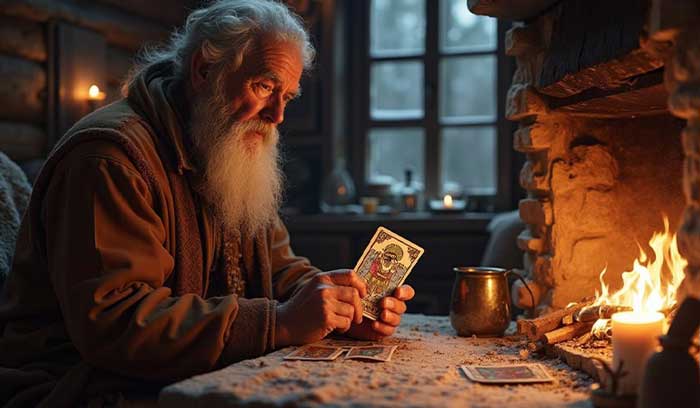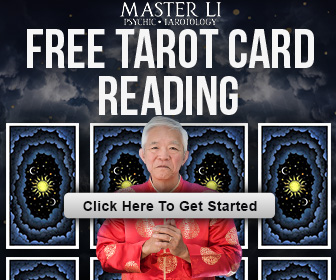The question “Are tarot cards evil?“ has been debated for centuries. Some people view tarot as a dangerous tool linked to dark forces, while others see it as a powerful instrument for self-reflection and spiritual guidance.
As a professional tarot reader with years of experience, I aim to dispel myths, clarify misconceptions, and provide a balanced perspective on whether tarot cards are truly “evil” or simply misunderstood.
By the end of this article, you’ll have a well-rounded understanding of tarot cards and whether they align with your personal beliefs.
Table of Contents
The History of Tarot: From Playing Cards to Spiritual Tool
Early Origins
Contrary to popular belief, tarot cards were not originally created for occult purposes. The earliest known tarot decks date back to 15th-century Europe, where they were used as playing cards in games like Tarocchi.
It wasn’t until the 18th century that tarot became associated with mysticism, thanks to occultists like Antoine Court de Gébelin and Eliphas Levi, who linked the cards to ancient Egyptian wisdom and Kabbalistic traditions.
The Rider-Waite-Smith Deck and Modern Tarot
The most influential tarot deck in modern times is the Rider-Waite-Smith deck, published in 1909. Designed by artist Pamela Colman Smith under the guidance of mystic A.E. Waite, this deck introduced detailed imagery with symbolic meanings, making tarot more accessible for divination and introspection.
Key Takeaway:
Tarot cards were not inherently “evil” in their origins—they evolved from a simple card game into a spiritual tool over centuries.
Common Misconceptions About Tarot Cards
Many fears about tarot stem from misinformation. Let’s debunk some of the most persistent myths:
1. “Tarot Cards Are Demonic or Satanic”
This belief often comes from religious teachings that associate any form of divination with evil. However, tarot cards themselves are not inherently tied to any religious doctrine—they are simply pieces of cardstock with symbolic imagery.
-
Fact: Tarot is a neutral tool—its energy depends on the user’s intentions.
-
Comparison: Just as a knife can be used to cook or harm, tarot can be used for good or ill.
2. “Tarot Predicts the Future in a Fixed, Fatalistic Way”
Many people assume tarot reveals an unchangeable destiny, but professional readers view tarot as a guidance tool rather than a fixed prophecy.
-
How Tarot Actually Works: It highlights potential outcomes based on current energies, allowing for conscious decision-making.
-
Example: Pulling The Tower doesn’t mean disaster is unavoidable—it’s a warning to prepare for change.
3. “Only Psychics or Witches Can Use Tarot”
While some psychics use tarot, anyone can learn to read the cards. Many psychologists, life coaches, and therapists incorporate tarot for self-reflection and mental clarity.
Key Takeaway:
Tarot is not evil—it’s a tool for insight. Fear often comes from misunderstanding rather than actual danger.
Tarot vs. Religious Beliefs: Are They Compatible?
Christian Perspectives on Tarot
Some Christian denominations condemn tarot, citing biblical verses against divination (e.g., Deuteronomy 18:10-12). However, others argue that tarot can be used for meditation and self-improvement without conflicting with faith.
-
Alternative View: Some Christian mystics use tarot archetypes to reflect on biblical stories (e.g., The Hierophant as a symbol of spiritual teaching).
Other Spiritual and Secular Views
-
New Age Spirituality: Views tarot as a tool for connecting with higher consciousness.
-
Atheist/Secular Use: Treats tarot as a psychological mirror for exploring subconscious thoughts.
Key Takeaway:
Whether tarot is “evil” depends on personal belief systems—many people integrate tarot into their faith or use it neutrally.
How Modern Tarot Readers Use Cards Ethically
Responsible tarot readers follow ethical guidelines to ensure their practice remains positive and empowering:
1. Focusing on Empowerment, Not Fear
A good reader will never:
-
Claim to curse or hex someone.
-
Predict death or irreversible doom.
-
Pressure clients into dependency.
Instead, ethical readings emphasize:
-
Self-awareness.
-
Problem-solving strategies.
-
Free will and personal responsibility.
2. Setting Clear Intentions
Before a reading, setting a positive intention (e.g., “I seek clarity, not control”) helps maintain an ethical approach.
3. Avoiding Exploitation
Unfortunately, some fraudulent psychics use fear tactics to manipulate clients. Always seek reputable readers who prioritize honesty and empowerment.
Key Takeaway:
Tarot itself isn’t evil—but like any tool, it can be misused. Ethical readers focus on guidance, not fear-mongering.
Personal Experience: Why I Don’t Believe Tarot Is Evil
As a professional tarot reader, I’ve conducted thousands of readings, and not once have I encountered “demonic” forces. Instead, I’ve seen:
-
People gaining clarity on difficult decisions.
-
Clients overcoming anxiety by understanding subconscious fears.
-
Spiritual seekers finding deeper self-awareness.
Tarot has helped many of my clients navigate career changes, relationships, and personal growth—far from the “evil” stereotype.
Final Verdict: Are Tarot Cards Evil?
After examining history, debunking myths, and exploring ethical practices, the answer is clear:
Tarot cards are not inherently evil. They are a neutral tool that reflects the intentions of the user. Whether used for spiritual insight, psychological exploration, or creative inspiration, tarot’s power comes from how it’s applied—not from any dark or supernatural force.
Who Should Avoid Tarot?
-
Those who believe it conflicts with their religious views.
-
Individuals prone to superstition or anxiety about the occult.
-
Anyone seeking absolute, unchangeable predictions (tarot is about guidance, not fate).
Who Might Benefit from Tarot?
-
People seeking deeper self-understanding.
-
Those looking for alternative perspectives on life challenges.
-
Spiritual seekers exploring symbolism and intuition.
Conclusion: Tarot as a Tool for Growth, Not Evil
The fear that tarot cards are “evil” stems largely from cultural and religious stigma rather than factual evidence. Historically, tarot was a game before it became a spiritual tool, and its modern use is more about introspection than dark magic.
If you approach tarot with an open mind—focusing on empowerment rather than fear—it can be an incredibly valuable resource for personal and spiritual development.
Final Thought:
The true “evil” in any practice lies in manipulation and fear—not in the tools themselves. Tarot, when used ethically, is a guide to wisdom, not a doorway to darkness.


